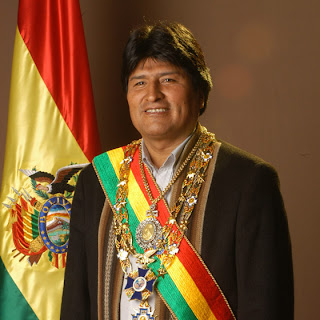
Este fervor hacia la política me llevó a elegir Bolivia sobre un país de África para pasar mis seis meses de voluntariado con ICYE (International Cultural Youth Exchange). También me influyó la propaganda de mi profesor de español en los E.E.U.U, quien me mostró un documentario acerca del Presidente Evo Morales de Bolivia. De todos modos, ya he estado en Bolivia por más de dos semanas ahora, y el tiempo ha llegado para escribir sobre la situación política acá. Vivo en La Paz, la capital donde siempre se ocurre las protestas y marchas, y por eso estoy aun más emocionante sobre las elecciones que vienen para los gobernadores del ¨departamentos¨ de Bolivia (equivalente al ¨estado¨ o la ¨provincia¨ en otros países).
En el Dapartamento de La Paz, por lo general siempre gana el partido de Evo Morales, se llama MAS (Movimiento al Socialismo). Si me preguntaras al momento, te diría que el Movimiento al Populismo sería el mejor nombre, pero de todos modos, parece que el candidato de MAS ganará la próxima elección de gobernador otra vez. Pero hace unos días que ocurrió algo bien interesante: El candidato indígena para el MAS, Félix Patzi, fue arrestado por conducir mientras borracho. Inmediatamente, el Presidente Evo le mandó a Patzi que renunciara su candidatura, y acordó hacerlo Patzi al principio. Sin embargo, más adelante cambió de idea cuando le regaron sus partidarios de las comunidades indígenas. Patzi dijo que ya estaba cumpliendo la sentencia que le dio su comunidad indígena para castigarle, y por eso puede seguir su candidatura sin vergüenza.
Aparentemente, en la Constitución de Bolivia, existe alguna ley que le da mucho valor a la justicia comunitaria. La justicia comunitaria es la forma de castigación para la mayor parte de los indígenas, según sus tradiciones antiguas de sus ancestros. Incluye castigos de trabajo manual como construir 1,000 abodes (ladrillos hechos de tierra, agua, y paja), como está haciendo Patzi. A mi familia de La Paz siempre le gusta bromear sobre las supersticiones dentro de estas justicias comunitarias, y por eso probablemente haya un aspecto espiritual muy importante en estas tradiciones. De todos modos, Patzi justifica la continuación de su candidatura con la cumple de su sentencia comunitaria.
 Además, Patzi está tratando de desviar la atención hacia su delito por ilustrar su incidente de borrachera como un ataque exagerado por las personas que quieren atacarle por ser un indígena. En otras palabras, Patzi está escondiéndose detrás de un escudo de raza — una estrategia muy genial, debo admitir, porque el tema de raza puede encender fuertes sentimientos que abruman la lógica, especialmente cuando estamos hablando de gente sin una educación completa. Además de manipular el tema de raza, Patzi también está jugando otra fuerte carta en su mano al mismo tiempo cuando dice que ya ha pedido perdón al Presidente Evo y que Evo ya lo aceptó. Evo tiene un posición como el Dios acá para un gran parte de Bolivianos y en particular para la base del MAS, o en otras palabras, la base de Patsi.
Además, Patzi está tratando de desviar la atención hacia su delito por ilustrar su incidente de borrachera como un ataque exagerado por las personas que quieren atacarle por ser un indígena. En otras palabras, Patzi está escondiéndose detrás de un escudo de raza — una estrategia muy genial, debo admitir, porque el tema de raza puede encender fuertes sentimientos que abruman la lógica, especialmente cuando estamos hablando de gente sin una educación completa. Además de manipular el tema de raza, Patzi también está jugando otra fuerte carta en su mano al mismo tiempo cuando dice que ya ha pedido perdón al Presidente Evo y que Evo ya lo aceptó. Evo tiene un posición como el Dios acá para un gran parte de Bolivianos y en particular para la base del MAS, o en otras palabras, la base de Patsi.
En conclusión, aunque Patzi todavía está enfrente de mucha oposición de gente poderosa de su propio partido (como el vicepresidente Álvaro García Linera) que no aprueba de su comportamiento, parece que Patsi podrá mantener su candidatura por Gobernador del Departamento de La Paz sin demasiadas dificultades. Después de todo, las masas son fáciles para manipular, y Bolivia no es una excepción.

--------------------------------------------------------------------------------------
English Version
From the moment that my dad thought I was mature enough to listen to the details of his work in the city government of my hometown Kaohsiung, I’ve always been very interested in politics. I followed the news of the latest political battlegrounds in Taiwan with the zeal of my father; his passion was simply contagious. Even after I moved to the United States, my love for politics continued to manifest itself in America’s political arena — I was almost always updated with the newest reports about areas of disagreement between Republicans and Democrats. This passion of mine reached a peak during the presidential campaigns in 2008-09, when I spent at least one hour each day reading political articles from national publications such as the New York Times and Washington Post. Obama’s promise of change truly inspired me, and in the end, I can’t express how happy I was when Obama completely defeated McCain in the Electoral College.
This fervor towards politics led me to choose Bolivia over an African country for my 6 months of volunteering with ICYE (International Cultural Youth Exchange). Another contributing factor to this decision was the extensive propaganda campaign launched by Profe Hopkins, my Spanish teacher in the U.S. who showed me a very interesting documentary about President Evo Morales of Bolivia. Anyway, I’ve been in Bolivia for more than two weeks now, and the time has come to write about the political situation here. I live in La Paz, the country’s political capital that’s always hosting a multitude of protests and marches. This heated political atmosphere has only fired up my passion even more, especially when the country’s just about to have a series of elections for governors and mayors across the nation.
In the “Department” of La Paz, generally speaking, President Evo Morales’s party “M.A.S: Movement Towards Socialism” pretty much always wins. If you asked me, I’d say that “Movement Towards Populism” would be a more accurate name for his party, but anyway, right now it seems that the candidate for M.A.S. is going to win the departmental election again. However, something interesting happened a couple of days ago: The indigenous candidate for MAS, Felix Patsi, was caught driving while he was drunk. Immediately, President Moralez ordered his resignation, and in the beginning of another series of dramatic events, Patsi acquiesced. Later on, Patsi would change his mind after assuring that he still had the firm support of his supporters from the indigenous communities. In order to alleviate the widespread social backlash against his misconduct, Patsi pledged to serve a “community punishment” that would allow him to continue his candidacy without shame.
Apparently, there’s a law in the Bolivian Constitution that gives a considerable amount of power to community jurisdiction. This “community jurisdiction” is the form of trial for the majority of indigenous communities, involving punishments that are based on the ancient traditions of their ancestors. An example of such punishments — the punishment that Patsi is serving right now — includes the handmade construction of 1,000 “adobes,” or bricks made from a blend of earth, water, and straw. My host family in La Paz always loves to make fun of the superstitions involved within these community jurisdictions, so there’s probably also a very substantial spiritual aspect in these traditions. Anyway, Patsi is using his compliance with the community jurisdiction of his people to justify the continuation of his candidacy.
Furthermore, Patsi is attempting to deflect public attention towards his misdemeanor by illustrating his drunkenness as an attack launched by racist individuals who aim to bring him down for his indigenous background. In other words, Patsi is hiding behind a racial shield — a very brilliant strategy, I must admit, because the subject of race has harbors the potential to enflame passionate sentiments that overwhelm the rationality of logic, especially when we’re talking about people without a complete education, as is the case with the majority of rural MAS supporters. Apart from playing the powerful race card, Patsi is also simultaneously pulling another hidden ace from up his sleeve when he says that he’s already apologized to President Morales, and that President Morales had already accepted his apology. For those of you who aren’t that familiar with the political situation in Bolivia, President Evo Morales enjoys a god-like status for a substantial portion of the Bolivian electorate, and in particular amongst the political base of MAS — or in other words, the political base of Patsi.
In conclusión, although Patsi still faces plenty of opposition from powerful figures within his own party (such as Vice President Álvaro García Linera) who disapprove of his recent behavior, it appears that Patsi will be able to maintain his candidacy for Governor of the Department of La Paz without too much difficulty. After all, the masses are easy to manipulate, and Bolivia is no exception.

 Además, Patzi está tratando de desviar la atención hacia su delito por ilustrar su incidente de borrachera como un ataque exagerado por las personas que quieren atacarle por ser un indígena. En otras palabras, Patzi está escondiéndose detrás de un escudo de raza — una estrategia muy genial, debo admitir, porque el tema de raza puede encender fuertes sentimientos que abruman la lógica, especialmente cuando estamos hablando de gente sin una educación completa. Además de manipular el tema de raza, Patzi también está jugando otra fuerte carta en su mano al mismo tiempo cuando dice que ya ha pedido perdón al Presidente Evo y que Evo ya lo aceptó. Evo tiene un posición como el Dios acá para un gran parte de Bolivianos y en particular para la base del MAS, o en otras palabras, la base de Patsi.
Además, Patzi está tratando de desviar la atención hacia su delito por ilustrar su incidente de borrachera como un ataque exagerado por las personas que quieren atacarle por ser un indígena. En otras palabras, Patzi está escondiéndose detrás de un escudo de raza — una estrategia muy genial, debo admitir, porque el tema de raza puede encender fuertes sentimientos que abruman la lógica, especialmente cuando estamos hablando de gente sin una educación completa. Además de manipular el tema de raza, Patzi también está jugando otra fuerte carta en su mano al mismo tiempo cuando dice que ya ha pedido perdón al Presidente Evo y que Evo ya lo aceptó. Evo tiene un posición como el Dios acá para un gran parte de Bolivianos y en particular para la base del MAS, o en otras palabras, la base de Patsi.


沒有留言:
張貼留言